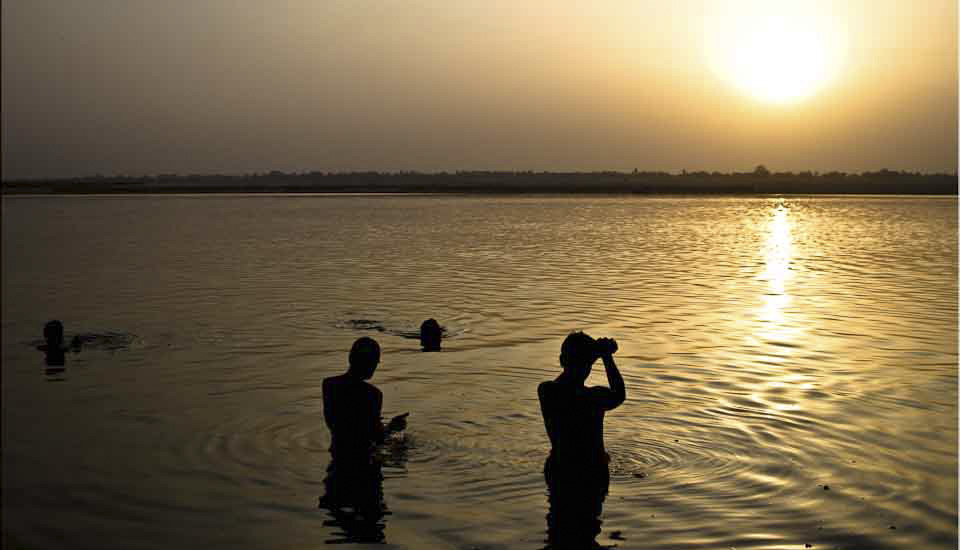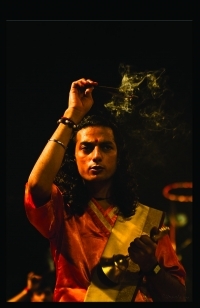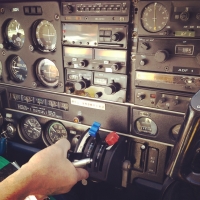.jpg)
Buddha in a Niche
There is something calming about a Buddha image – even when one is surrounded by earthquake ruins and at risk of being caught in a deluge!
Swayambhunath, also known as the Monkey Temple, is one of the most sacred religious sites in Kathmandu and is one of the seven monuments that contribute cultural heritage to the UNESCO-listed Kathmandu Valley.
This stupa is among the oldest religious sites in Nepal, dating back to about the beginning of the 5th century CE. For Buddhist Newars, it is the most sacred religious site in Kathmandu, but it is revered and regarded as a pilgrimage destination by Hindus and other Buddhists alike.
Although the Swayambunath complex suffered some damage in the April 2015 Nepal Earthquake, with outlying buildings crumbling, the eyes of the Buddha painted on the gilded spire atop the giant white stupa kept its watch – without harm – over the valley.
The last time I was there – under the tutelage of travel photographer Gavin Gough and photojournalist Jack Kurtz – it rained: even the monkeys had run for cover! The ancient, rambling grounds were wet and slippery; the scenery was punctuated by colourful raincoats and umbrellas; the sky alternated dark clouds with luminous pockets of light; and the city below was wrapped in a rainbow.
Join me at one of Nepal’s most important temples.
.jpg)
Buddha in the Pond
A bronze Bodhisattva- or Buddha-statue in the centre of the World Peace Pond welcomes us to Swayambhu Temple.
.jpg)
Prayer Flags and a Bell
In Hinduism and Buddhism, devotees ring bells at the entries of temples to inform the deity of their arrival. The sound of the bell is also said to help focus one’s mind in readiness for prayer or reflection.

Bell and Stupa
The ground is wet and the sky is full of prayer flags and rain.

Green Buddha in an Alcove
Every niche contains an icon, …

Stupa and Flags
… and everywhere, there are eyes watching!

Flags at the Top of the Stairs
The stairs to the upper level are swathed in prayer flags.

“Work in Progress”
Although Swayambhunath suffered less damage in the April 2015 earthquake than many other sites, there are still repairs to be made.

Woman Selling Candles
But, devotion and work continue among the rubble.

Gold Buddha in Red

Prayer Wheels
Traditionally, Buddhist prayer wheels are spun clockwise to symbolise the “turning the wheel of Dharma” and to release the mantra Om Mani Padme Hum, which is written in Newari (Nepali) script on the outside of the cylinder.

Shiny Shrines
The rain washes the surfaces clean …

Central Stupa
… and the spire of the stupa rises into the clouds.

Shrines
A variety of shrines and temples dot the upper layer …

Bodhisattva amid the Sales
… and Buddhas, Bodisattvas, and souvenir sellers are tucked into every space.

Candles in a Shrine

Ornate Surfaces
Every surface is carved and decorated.

Golden Buddha behind a Screen
I love the textures and patterns all around the grounds.

Rainbow over Kathmandu
Swayambhunath sits atop a hill in the Kathmandu Valley, affording views back over the sprawling city.

Marigolds and Wrought Iron
Buddhism is heavily influenced by Indian Hinduism and it is common to see marigolds at temples. Of course, these “Mary’s Gold” flowers also feature in early Christianity.

Dome of the Stupa
The large white dome of the stupa represents the entire world, …

Prayer Wheels
…and Hindu and Buddhist faithful spin the prayer wheels as they perform their clockwise circumambulations of the stupa.

Golden Top of the Stupa
The eyes of Buddha, looking in all four directions, represent wisdom and compassion.
These images calm me, as I wait for a new conflagration half way across the world. If the Nepali can worship so serenely in the aftermath of deadly earthquake, surely I can hold firm in the face of Antipodean fires!
Oṃ maṇi padme hūṃ …

In Nepal, like other Tibetan Buddhist countries, this is the most ubiquitous mantra and an ever-present feature of the landscape. I found myself repeating it while I was there – and I felt better.
Oṃ maṇi padme hūṃ …
Pictures: 11March2017



.jpg)























.png)

